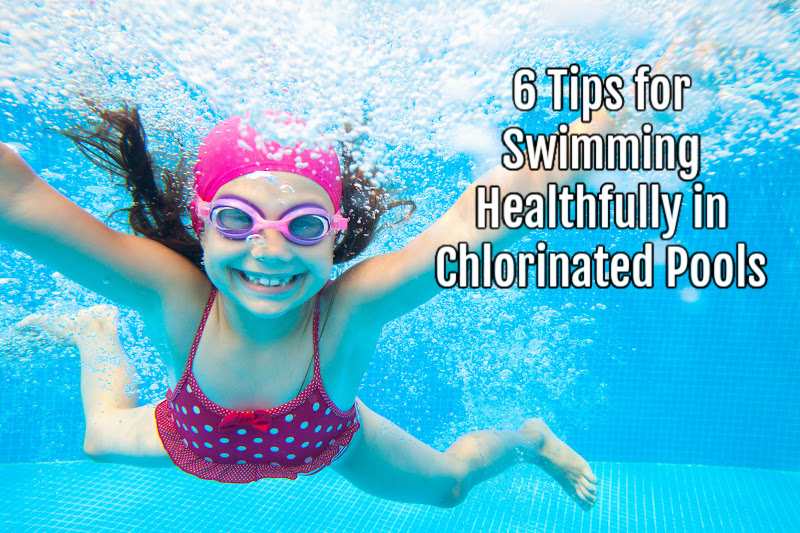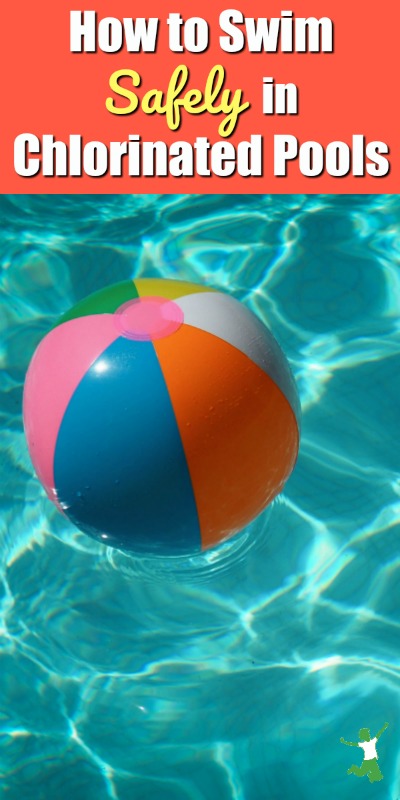The reasons why swimming in chlorinated pools is dangerous to health and the 6 steps to take to protect yourself and your family while still enjoying water fun all summer long.

The reasons why swimming in chlorinated pools is dangerous to health and the 6 steps to take to protect yourself and your family while still enjoying water fun all summer long.
An important topic to explore as we head into the summer season is chlorinated pools.
Chlorine is popular because it handles the three main jobs in keeping a swimming pool clean: It sanitizes (kills bacteria and germs), oxidizes (controls organic debris from perspiration and body oils), and deters algae. The chemical is unpopular, however, because it has a strong odor, reddens eyes, causes allergic reactions in some swimmers, and is a known carcinogen – meaning it has been linked to cancer!
Chlorine absorbs into your skin. Too much exposure to chlorine has been linked to major health problems including reproductive disorders and even birth defects. It can cause your skin and hair to dry out and over time too much exposure can even cause wrinkles.
Editor’s Note: Have you ever wondered why Olympic swimmers seem to have so many wrinkles at such young ages and most of the men start losing their hair so quickly? Could it, in fact, be caused by overexposure to chlorine for so many years and so many hours every day? Perhaps so.
When chlorinated pools are indoors, toxic gases such as nitrogen trichloride are released, which can be very dangerous. When we breathe in this gas it can cause severe damage to the lining of the lungs which could lead to respiratory problems or asthma. This toxic gas can be harmful at any age yet it poses the most risk to elderly people and small children.
So while chlorine used to disinfect swimming pools is widely recognized as a health hazard, not everyone has access to the ocean or a lake, or pools treated with ozone, ionizers, bromine, silver-cooper, or other alternatives which can frequently be much more expensive.
6 Tips to Protect Health in Swimming Pools
If you or your family members do choose to swim in chlorinated pools, some recommendations I’ve read are to:
1. Swim in outdoor chlorinated pools only if at all possible. It is much safer because the toxic gases are mostly eliminated in the open air.
2. Swim in chlorinated pools occasionally. It is regular exposure to chlorinated pools that presents the greatest risk to health.
3. Shower immediately before and after using a natural Castile soap.
4. Drink plenty of home-filtered water (better than bottled!) beforehand so that you are well hydrated.
5. Consider wearing a mask and snorkel to shield your eyes – and even a wetsuit, if you are willing to go that far!
6. Get fresh air afterward so you don’t continue to inhale the fumes, and can clear your lungs.
Why shower immediately before swimming in a chlorinated pool?
Julie Deardorff explains in her article published in the Chicago Tribute, “Another important reason to shower is that our bodies generally contain residue from consumer products, including perfume, make-up, body lotion, shampoo, and sunscreen.
When the chemicals used to disinfect the pool mix with organic matter (sweat, hair, urine) or nitrogen-rich substances (commonly found in consumer products) it can create a more toxic agent, said Michael Plewa, a professor of genetics at the University of Illinois whose new research has linked pool chemicals to health problems, including asthma and bladder cancer.”
Red, burning, itchy eyes and skin?
What I’ve read is that the presence of chloramines can cause reactions such as red, burning, irritated eyes: Chloramines form when chlorine reacts with ammonia. Ammonia enters the pool through sweat and urine. It is important to teach children not to urinate in pool water [even though it is chlorinated].
Also, showering before swimming can remove excess sweat that interacts with chlorine. My understanding is that if the sweat is on your skin, and hasn’t been rinsed off first in the shower, the chlorine will interact with the sweat on your skin as you enter the pool, and may result in some folks getting itchy skin.
So, what do you think? Do the benefits and joy of swimming and playing in a pool outweigh the health risks of chlorine?

Additional articles on this topic
The Dangers of Chlorine
Asthma In Swimmers
Swimming Pools May Increase Cancer Risk
The Hidden Danger of Swimming Pools
Swimming Pool Alternatives to Chlorine
Water Birth Dangers








Thanks for the helpful info.
I read that food grade hydrogen peroxide can be used as an alternative to clean/ SHOCK your pool, not sure about how affective that may be but if anyone has tried it I would appreciate their input. My concern is the effect of the peroxide on my hair.
The good Chlorine does in pools definitely outweighs the bad. Can you imagine what toxins and germs would accumulate in swimming pools if not for Chlorine? What must be learned here is to swim in moderation and rinse off before and after swimming (Let’s face it, most of us don’t!). Many people can’t afford the more expensive alternatives. As with any thing else, too much can be harmful so you must use common sense when putting yourself in contact with substances that can irritate.
FYI, summer solstice was yesterday, the 20th this year!
We use a mineral additive that allows us to keep our chlorine levels extremely low for an outdoor pool. We’ve had zero problems since we started using this and much less dry skin problems and irritations. I think it’s called Pool Rx.
I just read about using Vitamin C to help after swimming in chlorinated water. Here is the link:
Due to my thyroid issues, chlorine, bromine, and fluoride are serious issues for me- which all tend to be in the water. I am glad that I have now found something to help counter act our swimming in pools!
Interesting tip – thanks, Laura!
Very interesting article. I swam competitively for 13 years, year round, and in the summer spent hours and hours in the pool even outside of practice. I never really understood the shower before you get in the pool thing–that is, unless you visably have dirt/grime on you. In my experience, you sweat a TON in the pool if you’re swimming hard enough (pulse 160 for 2 hours). You just don’t feel it as much because you’re wet. I’ve been known to loose up to 2 pounds during a swim practice. Definitely shower afterwards!
After so many years in the pool, I haven’t experienced any of the above side effects. Both of my kids were easily conceived and are perfectly healthy. I guess something to look out for as I get older?
Shortly after I graduated high school, I learned they switched to a bromine pool. Just one word on that: ICK! Created an almost visible grease slick on all of the swimmers. They all had really terrible acne, it clogged the filters, and it stunk. They’ve since switched back. The YMCA near us has just switched to a saline type of pool…the verdict is still out on that one. We only go there once a month or so. I guess I’m a big fan of chlorine pools.
I remember once we went to Florida for a training trip in college around Christmas time. It was very welcome since it was -35 degrees in Iowa when we left. We had an outdoor pool to practice in and the 65 degree weather was awesome to swim in. 🙂
Makes you long for the days when we swam out back in the pond in the woods and got sunburned lying at the waters edge drying off.
In Ct. the drinking water is like sipping from a chlorinated swimming pool…also a simple shampoo with this water is so damaging to skin and hair…be sure to use pre conditioner pre swimming product before getting into the water or before washing hair with bad tap water….
What about adding baking soda to the water, would that work to help with the algae and bacteria?
Sher, I am not sure about baking soda? I didn’t know it was indicated for algae? Do you have a pool where you might check it out?
what a great post! i had no idea!